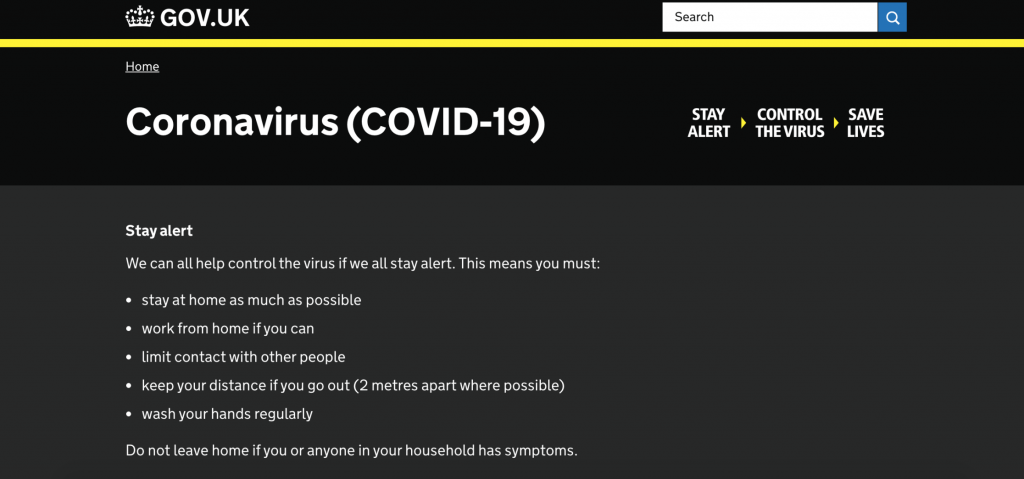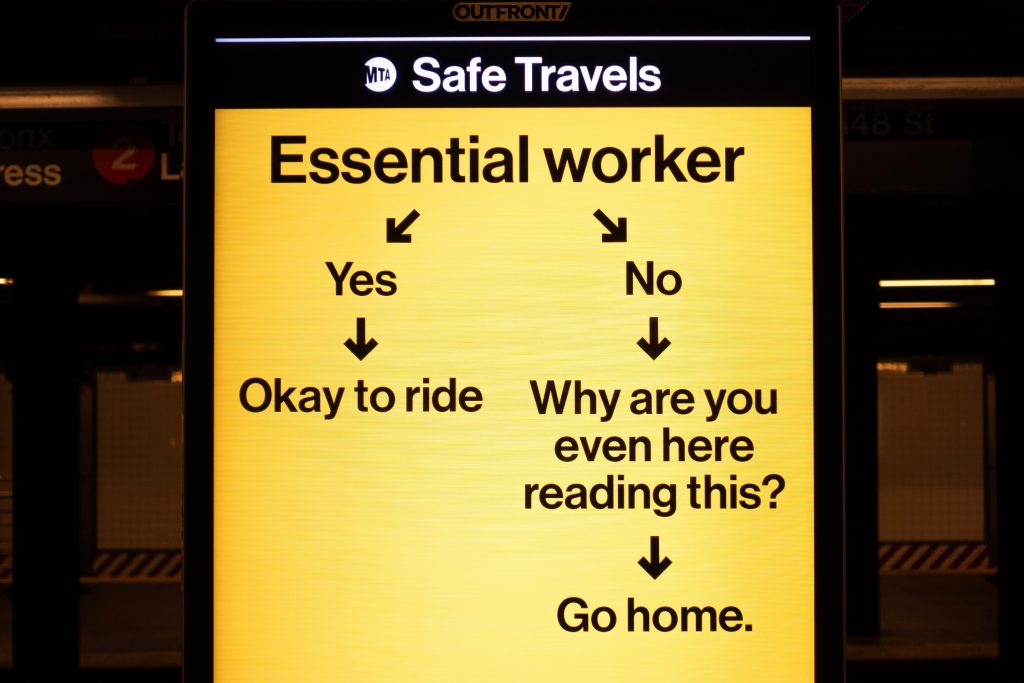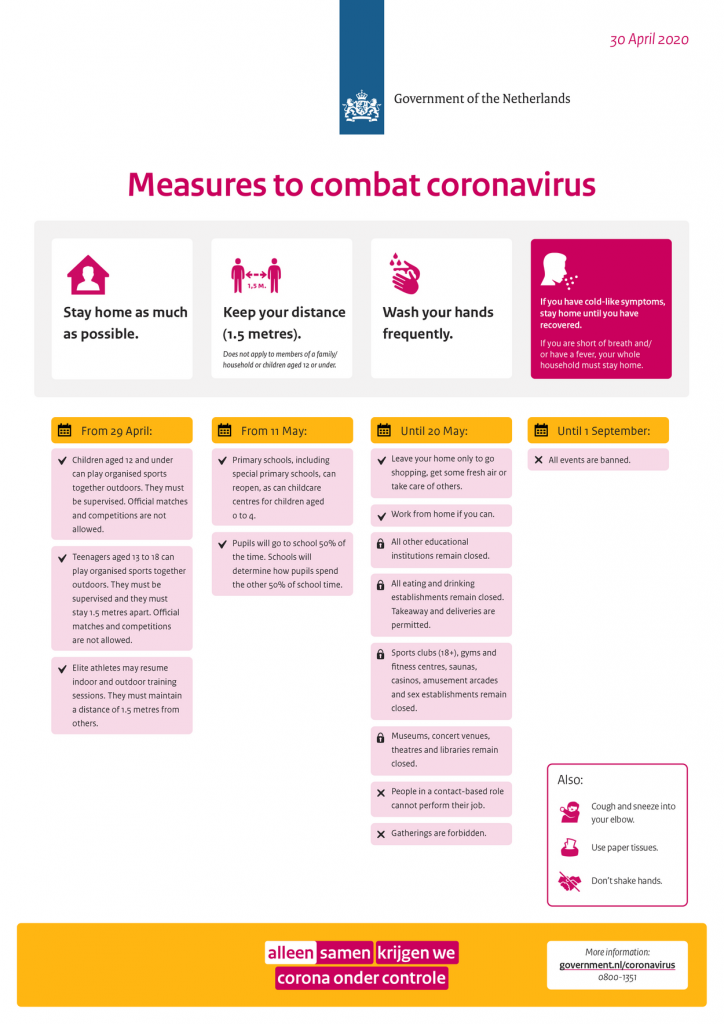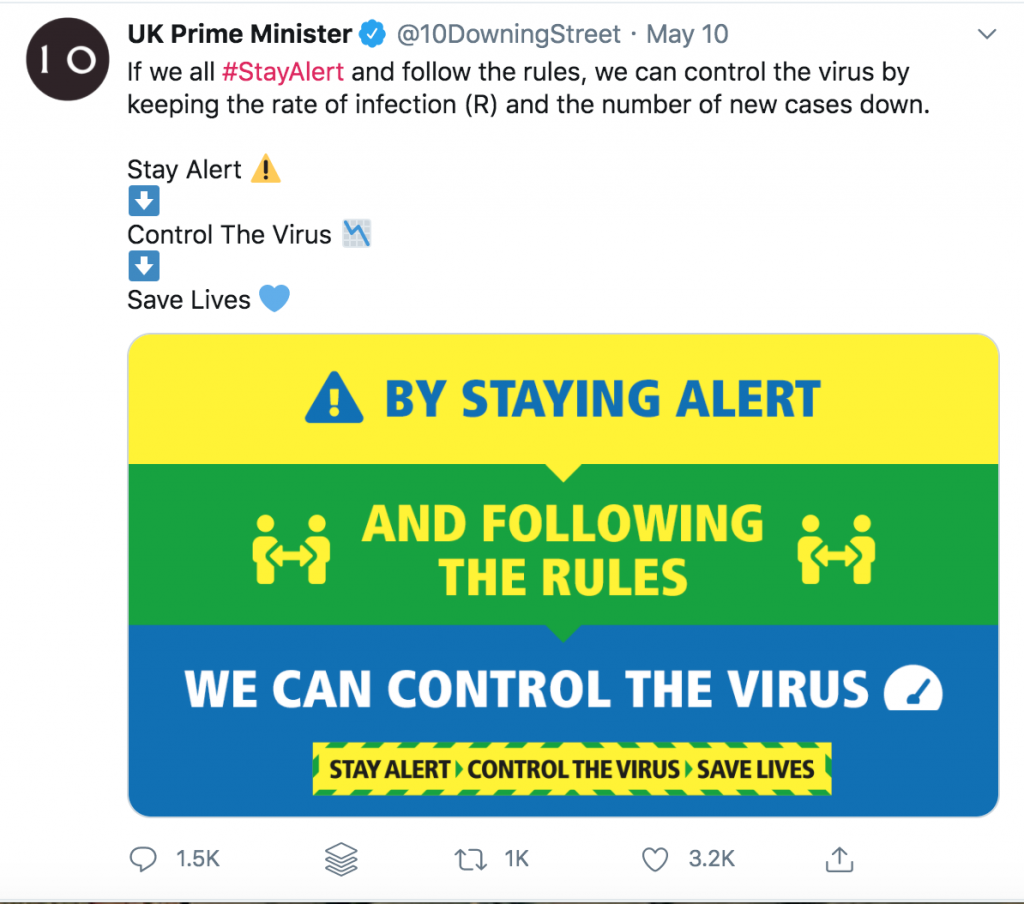Messaging is the single most important part of any communication strategy. Get that wrong and everything else falls apart like a house of cards. Currently, the Dutch and UK governments are showing two radically different approaches: one structured, one not. Let’s take a look.
Download this article as a pdf (no email required).
I’ll make no commentary or value judgements on how the UK or NL are handling COVID-19 in this post, and focus purely on a ‘technical comms’ review of the Dutch and British communications to date. I’ll focus on messaging and its delivery.
Why messaging?
Messaging is the single most important part of any communication strategy.
Get it wrong, and everything else falls apart like a house of cards.
Without further ado …
Well-structured messaging
The Dutch governmental folks have consistently crafted rock-solid, well-structured communication.
 Messaging connects across all levels of abstraction: from the highest level of strategy and policy, down to tactics and regulation. And it is split neatly across different audiences, wherever needed.
Messaging connects across all levels of abstraction: from the highest level of strategy and policy, down to tactics and regulation. And it is split neatly across different audiences, wherever needed.
Information is grouped appropriately and summarised cleanly. It is ‘MECE‘ (mutually exclusive and collectively exhaustive) enough to get the job done.
Key messages are synthesised well. They are logical, consistent and connect to form persuasive argumentation.
When you structure messaging well; when you know the difference between your key messages and your supporting arguments, and which level of importance everything sits on, you can easily scale messaging over time.
This is what the Dutch government is doing now with its roadmap to open up NL. The new messaging clarifies an ‘intelligent lockdown’ in a ‘1.5 metre society’. That’s smart.
First, the use of ‘intelligent‘ cements the government’s promise to follow expert health advice and stay practical on a business/economic level. Second, the use of the 1.5 metre ‘society‘ embeds current social distancing rules on a societal level, so keeping health under control by appealing to each individual’s sense of responsibility.
All is straightforward language-wise. Everything does ‘what it says on the tin’. Everyone knows what is expected of them, in every situation.
The Dutch are knocking it out of the park, even in their second language by the way.
What about messaging delivery?
Super-clean delivery
The Dutchies are delivering their messaging really well across governmental sites, and external media.
The (English language part of the) Ministry of Health, Welfare and Sport site, for example, is easy to navigate and has great UX. The structured messaging is a natural fit with the site’s well-structured site architecture.
This means that SEO tags are a no-brainer. The net result is that when anyone searches on a search engine about coronavirus in NL, they’ll find the definitive answer — from the government, rather than some savvy content marketer/news outlet jumping on the corona bandwagon.
Good typographic ratios and graphic design complement and reinforce the inherent structure of the messaging in the NL governmental sites. This is a nice thing you don’t often see.
Messaging collateral is executed to good content strategy principles.
Relevant downloads, for shops and institutions, for example, are located exactly where you would expect to find them, just a couple of clicks away.
I’ve seen the exact same text from many sites posted across Facebook groups, corporate and SME websites, news sites and blogs and more, throughout NL, without changes or adaptations. The implication: the messaging from the Dutch government just works.
It is no small thing to deliver high-quality messaging, well. These folks have had to get many digital comms disciplines working as one to get there.
And they nailed it.
What about the UK?
Unstructured messaging
The original highest-level UK Government key messages were good.
‘Stay Home, Protect The NHS, Save Lives’ makes sense. It is logical and consequent. This messaging told UK folks that:
- If you stay at home; then
- You will protect the NHS from overloading; and so
- You will save lives.
That is a crystal clear message.
It even works despite the fact that the supporting language peppered good logic with countless caveats such as; ‘if you can,’ ‘where possible,’ ‘if you have to,’ etc., which undo some of the good work done.
But when Boris changed switched messaging to, ‘Stay Alert, Control the Virus, Save Lives,’ in his address on opening up the UK, things fell quickly apart.
Comedian, actor and writer Matt Lucas summed up the sentiment about Johnson’s address in his spoof video:
“So we are saying, don’t go to work … go to work … don’t take public transport … go to work … don’t go to work, stay indoors … if you can work from home, go to work …”
Other trustworthy commentators described it succinctly as a dog’s dinner of communications that, “sowed doubt, confusion and uncertainty.”
‘Stay alert by washing your hands,’ which Number 10 advised, is a good example.
Linguistically, it makes no sense. It’s not logically consequent (one thing does not naturally follow the other). One does not stay alert by washing one’s hands. And it only reinforces things people have been doing for months already. So it makes little sense, behaviourally.
(Two days after posting this post, Number 10 announced that we should actually, ‘Stay alert to stay safe‘. Sigh.)
So what does this then imply for all three of messages of, ‘Staying Alert,’ ‘Controlling the Virus,’ ‘Saving Lives’?
Do we now need a qualifying message for each one, the same as ‘Staying alert by washing my hands?‘ And Stay alert to stay safe‘. Or are they an argument in themselves, like the old messaging? What’s going on?
I’m not being pedantic. Instead, I am thinking about the ‘internal dialogue’ of various audiences, which is a critical part of developing effective messaging. Considering an audience’s internal dialogue involves thinking about your messaging from a specific audience’s point of view, working through what their likely understanding and behavioural response would be, and adjusting your messaging until you are most sure you will get the behavioural outcome you are after.
As things stand right now, the UK’s messaging raises more questions than it provides answers. And Johnson’s appeal to “good, solid British common sense” basically confirms he’s not really thought things through.
Factually, ‘common sense’ is neither good, solid, nor common to everyone. As this article in Psychology Today puts it, “… it’s reckless for public health to rely on a phrase that means too many things to too many people”. (Edit: One commenter on this post reminded me that the Dutch also made the mistake of appealing to ‘common sense’ back in March, with disastrous results, to which they responded swiftly.)
Different people think differently. That is why good communications are structured. It is why we summarise and synthesise, it’s why we have different levels of abstraction — so we can connect the right message with the right audience, while making sure all are considered.
So what about delivery?
Poor delivery
As you might expect, delivery of the messaging is also poor.
 The UK Government website has suffered from major design creep over the years, the once clean and tight design hierarchy slowly dissolving. The new key messaging is badly designed and stuck randomly on the header.
The UK Government website has suffered from major design creep over the years, the once clean and tight design hierarchy slowly dissolving. The new key messaging is badly designed and stuck randomly on the header.
It seems like a web editor has tried to make the best out of a bad job when putting the rest of the text and collateral in, but, there’s only so much you can ‘fix in the mix’. Supporting collateral is often four or five clicks away. That’s too much.
 I’m going to skip over the UK Government’s horrendous graphs, only to say you should check out this teacher’s (funny and entirely accurate) assessment of them in London Economic.
I’m going to skip over the UK Government’s horrendous graphs, only to say you should check out this teacher’s (funny and entirely accurate) assessment of them in London Economic.
Plus, as Saatchi & Saatchi’s chairman and chief strategy officer commented, the bizarre decision to replace the arresting and effective “red for emergency” art direction with some “green for go” bunting on the key messages, what we have is a recipe for confusion.
Day by day, it appears to be falling further and further apart.
It is becoming nigh-on impossible to even critique the comms sensibly.
It hurts my eyes, head and heart.
Moving on…
Effects of the UK messaging …
Unsurprisingly, after Boris’s lockdown address, the great British public immediately packed back onto trains buses and the Tube, and headed off to work en masse. No masks. No social distancing.
Prof John Ashton CBE, a leading UK public health director, believes that number 10’s messaging could have a catastrophic impact on the country. As he said..
We do face, not so much a second wave but a continuation of the first wave and maybe even an exacerbation of the first wave.
In a global pandemic, poor communication literally costs lives, Boris.
Meanwhile, back in Holland …
“Together, we’ll get corona under control. Stay home as much as possible. Wash your hands frequently. When you do go out, keep your distance. We are living in a 1.5 metre society. Here is our roadmap for the next few months.”
Walk the Dutch streets and you see the same message across all signage. Key messages are being repeated by various institutions, public and private, from SMEs and consultants to the Dutch Royal Family. You can hear them in speeches and debates, online and on TV, where the Government is, yes, accurately quoted.
While there is healthy discussion and debate on coronavirus strategy, health policy and more, there is little confusion about what is currently happening; why, when and how. People know where they stand now. And they know where they are heading.
Society feels the impact of great communication from its leaders — from all its leaders.
Is there a takeout from all this?
You no doubt have your own.
Here’s mine, for now:
- ‘Inspirational’ sloganeering does not make for good strategic comms, no matter your industry, or focus as a leader. You need proper competences in message development, logic and argumentation, not just ‘some ideas and copy’. Hire a professional.
- Great communication builds trust and understanding between people, regardless of which side of any personal, political or professional fence we may sit. All leaders have an ethical responsibility to communicate well.
- Great communication makes difficult situations more manageable. It helps people make better decisions on how to move forwards with confidence. There is no great leadership without great communication.
Finally; Dutch government comms folks … Bravo!
Be splendid!
— Steve


















